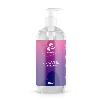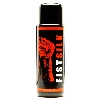Vaseline is an oil-based ointment. It's soft, sticky and smooth. It can also heat up easily in your hands. Looks like Vaseline would be a great lube for sex. The truth is, there are many better options. Vaseline should only be used if you are in trouble and don't have a more suitable alternative. Learn why Vaseline isn't a great lube choice and what to use instead.
What the Science Says
Having sex without lube can be unpleasant. Friction on dry skin can be uncomfortable, even painful. Friction during intercourse can also cause tiny tears in the thin skin of the vagina, penis, or anus. This increases the risk of sexually transmitted infections (STDs).
Vaseline is not an ideal lubricant for sex. However, it can be used if no better options are available. If you decide to use Vaseline as a lubricant, keep these factors in mind:
It has staying power. Petroleum-based product may actually last longer and may not dry out as quickly as water-based lubricant. This also has a downside. Vaseline can be difficult to clean off or wash off after sex. It can take several days for the Vaseline to completely leave your body.
Vaseline can increase the risk of infection. Because petroleum jelly sticks together more than other lubricants, it can invite bacteria to create an infection. According to one study, women who use petroleum jelly inside their vaginas are 2.2 times more likely to test positive for bacterial vaginosis than women who don't use petroleum jelly.
Vaseline weakens condoms. If you plan on using latex or polyurethane condoms, you cannot use Vaseline. Vaseline is incompatible with latex products and weakens these types of condoms. Condoms can break or tear during sex and can lead to unwanted pregnancies or STIs.
Vaseline is messy. Petroleum-based products can stain sheets or clothing with greasy stains. If you plan on using Vaseline as a lubricant, protect your sheets or any fabric it may come in contact with to prevent stains.
What to use instead
Personal lubricants intended for use during intercourse are your best lubricant choice. These are typically water or silicone based. They are designed for the delicate tissues and environments of a vagina or anus. Therefore, they are less likely to cause infections. They are also less likely to cause irritation or itchiness.
Personal lubricants are designed to be highly effective for intercourse. They are slippery and soft and offer very little resistance during sex. You can buy these lubricants in pharmacies, grocery stores and specialized stores, like ours!
As a bonus, these water- and silicone-based lubricants are safe to use with condoms. They will not weaken the condom material. Keep a pack of lube handy with your condoms to be prepared for any event, planned or unplanned.
If you're looking for the safest type of lubricant, your best option is probably a water-based lubricant, like KY for example. Water-based lubricants are a good choice for both masturbation and intercourse.
Some personal lubricants have additive effects, such as flavors or ingredients that cause muscle tingling or relaxation. Before using them, check that you or your partner are not allergic to these additives. The best way to do this is to rub some of the fluid on the inside of your elbow. Wait a few hours. If you don't see any signs of irritation or sensitivity, you should be ready to go when things heat up between the sheets.
Avoid using Vaseline as a lubricant during sex if you can. While it's great for chapped lips, it's not great for vaginas or anuses. Instead, it looks for options designed for sex and checks to see if it's safe to use condoms.















